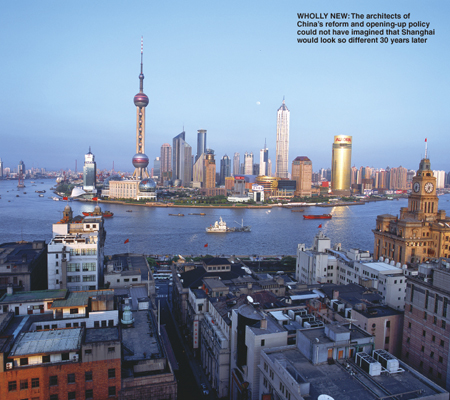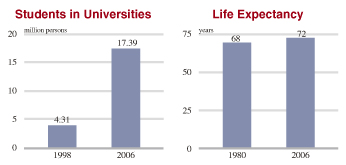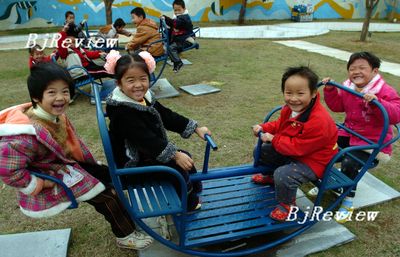|

The decision to begin reform and opening up, which was made at the Third Plenary Session of the 11th Central Committee of the Communist Party of China (CPC) in December 1978, has helped the Chinese people navigate through hard times and toward prosperity and rejuvenation in the past three decades.
During the course, the Chinese people have attained distinguished achievements and learned many lessons.
One outstanding achievement is that China's economic and comprehensive national strengths have been continuously enhanced and the living standards and welfare of the people have been further improved. China is currently the world's fourth largest economy in terms of gross domestic product (GDP), and will possibly overtake Germany to be the world's third largest in 2008. China now remains the world's third largest trader. Previously suffering shortages of many necessities, China today instead has excess production capacity on the whole. At the same time, living standards have been greatly improved and the people in general lead a comfortably well-off life. In 2006, China's per-capita GDP reached $2,000, and the rural population in abject poverty has decreased from 250 million in 1978 to 21.48 million at present, down from 30 percent to 2.3 percent of the country's total population, a remarkable achievement in the history of the world.

Another important change has taken place in the mindset of the people. Opening up has brought a new vitality to the people's tedious and uniform lifestyle and way of thinking, which, dominated by the personality cult of political leaders for years, was against humanity. The people's spiritual and cultural life has been enriched to promote diversified thinking. Discussion of such concepts as competition, efficiency, democracy and rule of law had never been encouraged before reform and opening up. The Chinese people today are enjoying greater freedom in thinking, making choices on their own and deciding their own fate. Thanks to reform and opening up, the Chinese people are freer, more self-reliant and more independent. Revolutions in spiritual and intellectual life have mobilized hundreds of millions of people who devoted themselves with creativity and enthusiasm to China's socio-economic development.
In the past three decades, China has established a market economy and the market has replaced the government to play a decisive role in resource allocation and social development. China has gradually assimilated into the global mainstream during the decades of reform and opening up. The market economy and democracy have proven to be the most successful institutional creations in human civilization up to the present day. In its reforms and opening up, China has learned the merits of these creations, and voluntarily observed the common rules for the development of human society so as to overcome the flaws of traditional Chinese concepts of rules and to promote augmentation of national welfare and restore wealth and power for the country.

A review of China's history shows that the nation has been open, strong and prosperous during several feudal dynasties, but it never happened that the nation truly assimilated into the external world and shared the common progress. Especially after Western capitalism emerged and led to industrialization, China adopted a "closed-door" policy and remained an agricultural society for 200-odd years. Poverty-stricken and weak, the country eventually lapsed into persistent turbulence. The reform and opening up of the past 30 years represent the first "open-door" policy in its true sense in China's history: China not only learned from Western countries' technologies, but also their experience in developing a market economy and democracy as well as Western civilization, in order to carry out institutional reforms. China has successfully seized the opportunities of the third wave of globalization and effectively participated in international division of work to develop its economy. With its WTO membership, China is recognized today as a member of the global mainstream. It's commitments and credit in the capacity of a sovereign country warrant that China will adhere to the reform and opening-up policy in its future development.
|
